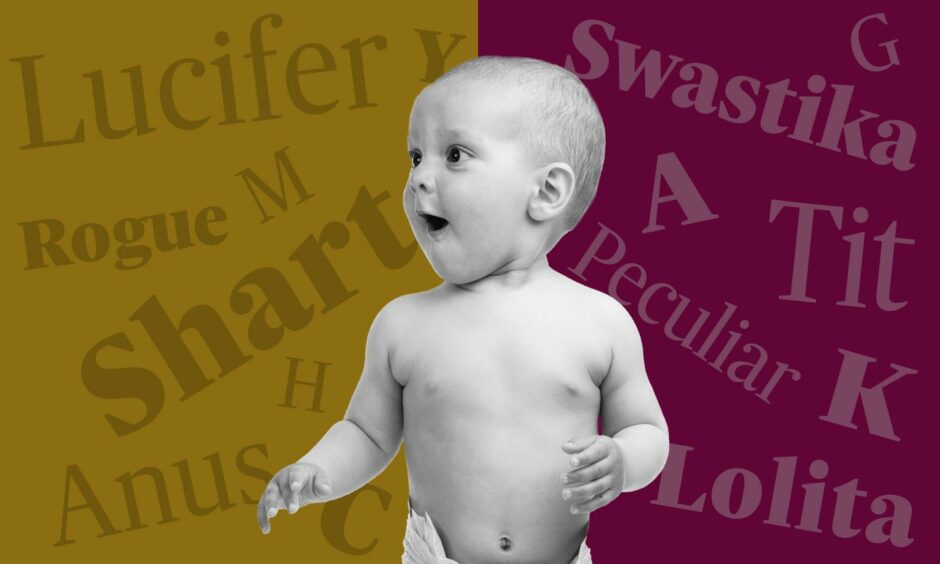
Did you know in many countries in the world there are strict rules on what you can name a baby?
In Finland, parents may choose freely…
Other names that have been rejected include; Anal, Constable, Lucifer and in a fairly famous case…
The very short answer is that there aren’t really any rules.
Tactful advice rather than rules on baby names
We received exclusive access to copies of the guidance notes used by Scottish registrars when recording baby names. The notes show that the registrars “are not empowered to insist on the registration of a birth under another forename or spelling from that chosen by the informant”, but that they may provide “tactful advice” around certain categories of names.
The first two categories are fairly broad and subjective enough that any “tactful advice” is likely to vary between registrar to registrar:
- The name chosen by a child’s parents is particularly fanciful
- An unusual spelling of a name is likely to cause confusion (the registrar may tactfully suggest to the informant that it might be in the child’s future interests to register him/her in the more usual form of the forename)
We’ve reported previously in this series on the rise in unusual names. If we look at the current top names in Scotland, Olivia and Noah – numerous unusual spellings can be uncovered in the data.
However, since 2024 the NRS has stopped including names used less than three times in a year so some variations may slip below the radar after 2023.
The last category that employees may provide advice against is less subjective:
- An initial letter is part of a child’s forenames and it is not intended as an abbreviation of any forename (the registrar should ensure that the informant understands the implications for the child, for example, the need for the child to explain in the future that the initial letter does not stand for anything)
Whilst not exactly common, a number of babies in Scotland have received names containing just an initial letter.
The first baby registered with just an initial was baby R, born in 1981.
One letter names peaked in Scotland in 2008, when nine babies with just an initial were registered.
Two As, Four Cs, and one baby was registered under the names I, J and T.
After providing “tactful advice” a registrar may provide a small postponement to the registration process to allow the parents to reconsider.
There are a further two categories highlighted in the guidance notes where the registrars are asked to seek advice from the General Registration Unit.
The first is if a parent wishes to use a name “which can be a title of dignity or status, such as ‘Sir’”. While there have been no baby Sirs in Scotland, the following titles have been used.
Objectionable or offensive baby names
The final category covered in the official guidance notes are names that “the registrar considers objectionable or offensive”.
This is clearly a very subjective bit of guidance – what is offensive to one registrar may not be to another. Names are also strongly tied to culture and what may be offensive to one part of society would be completely normal in some cultures.
Should some of the names in the chart below have been referred to the General Registration Office?
Whilst everyone has their own personal line for what they consider offensive or objectionable, it’s likely that in many other countries some of these names would not have been allowed.
For example in Denmark the name Anus has been banned for being too “obscene”, and the name Lucifer appeared on a banned name list from New Zealand.
We spoke to a mum who named her child Lucifer, one of the names on our list. While some people might find the choice offensive, she said there was a variety of reasons for choosing the name, but religion didn’t play a part.
The mum, who asked not to be named, said: “We named him after the TV show and loved the name, we didn’t give it too much thought beyond that. It certainly wasn’t a religious statement in our eyes.
“[We had] no problems registering at all, but the registrar that married us said she would have had a problem had it been her”.
Although an unusual choice, the mum said family and friends had been supportive.
She added: “Usually [we get] a positive response from people that know us, even our religious friends and family, negativity tends to come from people that don’t know us.”
Another factor to consider with such unusual names is whether your child may go on to change it as they get older as was the case with a baby boy named Shart, who was born in Dundee in 1981. He is the only baby in Scotland to ever have received the name but went on to change his name when he grew up due to the unforeseen connotations of the name.
The rules on special characters
Whilst the rules in Scotland are very unrestrictive, it also appears that registrars very rarely actually involve the General Registration Office for any potentially offensive names. We asked the NRS for any statistics they could provide on how often the GRU is contacted to intervene and received the following response:
“NRS holds no record of an inquiry from a registrar in relation to the registration of a birth where it is proposed that the child will be given such a name, and we hold no record of any inquiries where a registrar has been advised not to record the name chosen for the child. We can confirm we very rarely get inquiries at the time of registration about naming children.”
With that said, if any Scottish parents wish to take inspiration from the Musk family they may run into some issues.
Tesla chief executive Elon Musk and his then partner, musician Grimes, named their first child X Æ A-12 in 2020, which they pronounce “X A.I. Archangel,” or X for short.
Special characters appears to be the only real no-no in the Scottish registration system with the NRS stating names must be registered using the Roman alphabet.
Do you have an interesting story to tell regarding why you picked your babies name? Get in touch – datateam@dctmedia.co.uk


Conversation